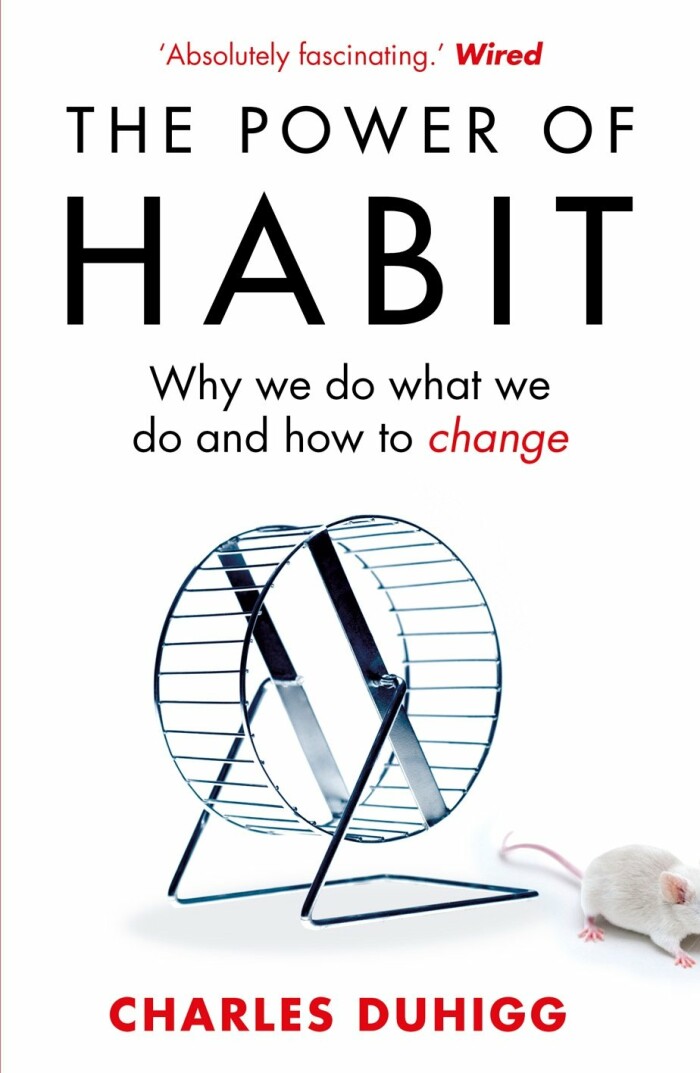
Support the author by purchasing this book with the link below!
PurchaseThe Power of Habit
Charles Duhigg
Published: 2012
The Power of Habit: Why We Do What We Do in Life and Business is a groundbreaking book written by Charles Duhigg, an American author and journalist. In this book, Duhigg explores the science of habit formation, delving into the latest research in psychology, neuroscience, and sociology to explain the mechanisms that drive habit formation. He argues that habits are a powerful force that shape our lives, and that by understanding the underlying mechanisms of habit formation, we can gain more control over our actions and ultimately change our behavior for the better.
The book starts off by exploring how habits are formed, and how they work. Duhigg explains how habits are comprised of a "habit loop" which consist of a cue, a routine and a reward. These habit loops become ingrained in the brain over time, creating automatic responses to certain cues that we encounter in our everyday lives. Duhigg provides several real-life examples of how these habit loops can be identified, tracked, and changed. For example, he describes how a woman who wanted to stop biting her nails, first had to find the cue that triggered the habit, which in this case was the phone ringing, and then change the routine by having a rubber band in hand when the phone rang and snap it to break the habit.
Throughout the book, Duhigg examines a wide range of habit-related topics, including the impact of habits on personal behavior, the role of habit in business, and how it affects organizational culture. He provides many examples of individuals who have successfully overcome bad habits and companies that have transformed their organizational culture by changing keystone habits. One example is of how Alcoa CEO Paul O'Neill, changed the company culture and improved performance by focusing on worker safety which then led to changes in other areas of the company.
The book also examines how habits are formed at the neurological level, and how they can be changed by manipulating the cues, rewards, and routines that make up the habit loop. He also highlights the role of social norms, and how they can act as cues and rewards in the habit loop.
The Power of Habit concludes by emphasizing that small changes in habits can lead to big results over time, and that by focusing on changing specific habits rather than broad goals, people can achieve greater success. Duhigg also provides actionable advice for individuals, as well as for managers, educators, and policymakers looking to make changes in their organizations.
The Power of Habit is a well-researched, thought-provoking, and accessible book that provides a deep understanding of the science of habit formation and how it can be used to improve our lives. It's packed with real-life examples, research and insights that are easy to understand and apply. Whether you're an individual looking to improve your own habits or an organization looking to change its culture, this book is an invaluable resource that will help you understand the power of habits, and how you can use them to achieve success.
The book starts off by exploring how habits are formed, and how they work. Duhigg explains how habits are comprised of a "habit loop" which consist of a cue, a routine and a reward. These habit loops become ingrained in the brain over time, creating automatic responses to certain cues that we encounter in our everyday lives. Duhigg provides several real-life examples of how these habit loops can be identified, tracked, and changed. For example, he describes how a woman who wanted to stop biting her nails, first had to find the cue that triggered the habit, which in this case was the phone ringing, and then change the routine by having a rubber band in hand when the phone rang and snap it to break the habit.
Throughout the book, Duhigg examines a wide range of habit-related topics, including the impact of habits on personal behavior, the role of habit in business, and how it affects organizational culture. He provides many examples of individuals who have successfully overcome bad habits and companies that have transformed their organizational culture by changing keystone habits. One example is of how Alcoa CEO Paul O'Neill, changed the company culture and improved performance by focusing on worker safety which then led to changes in other areas of the company.
The book also examines how habits are formed at the neurological level, and how they can be changed by manipulating the cues, rewards, and routines that make up the habit loop. He also highlights the role of social norms, and how they can act as cues and rewards in the habit loop.
The Power of Habit concludes by emphasizing that small changes in habits can lead to big results over time, and that by focusing on changing specific habits rather than broad goals, people can achieve greater success. Duhigg also provides actionable advice for individuals, as well as for managers, educators, and policymakers looking to make changes in their organizations.
The Power of Habit is a well-researched, thought-provoking, and accessible book that provides a deep understanding of the science of habit formation and how it can be used to improve our lives. It's packed with real-life examples, research and insights that are easy to understand and apply. Whether you're an individual looking to improve your own habits or an organization looking to change its culture, this book is an invaluable resource that will help you understand the power of habits, and how you can use them to achieve success.
1. Habits are a powerful force that shape our lives, and by understanding the underlying mechanisms of habit formation, we can gain more control over our actions and change our behavior for the better.
2. Habits are formed through a "habit loop" that consists of a cue, a routine, and a reward. Identifying these elements of a habit can help you understand and change it.
3. Small changes in habits can lead to big results over time. By focusing on changing specific habits rather than broad goals, people can achieve greater success.
4. Keystone habits, which serve as catalysts for change in other areas of life, are powerful tools for individuals looking to make changes in their lives.
5. By understanding the habit loop and patterns that emerge from it, it's possible to design successful change in organizations. Changing keystone habits among employees can help managers transform organizational culture.
6. Habits can be changed by manipulating the cues, rewards, and routines that make up the habit loop, this means that by changing the environment and social norms, habits can be broken and new ones adopted.
7. The book suggests ways in which habit formation can be leveraged to create more effective policies and educational programs. Understanding the power of habits can be used to create positive change in society through policies and programs.
2. Habits are formed through a "habit loop" that consists of a cue, a routine, and a reward. Identifying these elements of a habit can help you understand and change it.
3. Small changes in habits can lead to big results over time. By focusing on changing specific habits rather than broad goals, people can achieve greater success.
4. Keystone habits, which serve as catalysts for change in other areas of life, are powerful tools for individuals looking to make changes in their lives.
5. By understanding the habit loop and patterns that emerge from it, it's possible to design successful change in organizations. Changing keystone habits among employees can help managers transform organizational culture.
6. Habits can be changed by manipulating the cues, rewards, and routines that make up the habit loop, this means that by changing the environment and social norms, habits can be broken and new ones adopted.
7. The book suggests ways in which habit formation can be leveraged to create more effective policies and educational programs. Understanding the power of habits can be used to create positive change in society through policies and programs.
The Power of Habit: Why We Do What We Do in Life and Business is a book written by Charles Duhigg and published in 2012. It is a New York Times bestseller and has been widely acclaimed by critics and readers alike.
In the book, Duhigg explores the science of habit formation and how it can be applied to various aspects of life, including personal behavior and business practices. He argues that habits are a powerful force that shape our lives, and that by understanding the underlying mechanisms of habit formation, we can gain more control over our actions and ultimately change our behavior for the better.
Duhigg uses a combination of scientific research and real-life examples to illustrate his points, including stories of individuals who have successfully overcome bad habits and companies that have transformed their organizational culture. He also examines how habits are formed at the neurological level, and how they can be changed by manipulating the cues, rewards, and routines that make up the habit loop.
One of the key takeaways from the book is that small changes in habits can lead to big results over time, and that by focusing on changing specific habits rather than broad goals, people can achieve greater success. The book is aimed at a general audience, and provides actionable advice for individuals, as well as for managers, educators, and policymakers looking to make changes in their organizations.
In the book, Duhigg explores the science of habit formation and how it can be applied to various aspects of life, including personal behavior and business practices. He argues that habits are a powerful force that shape our lives, and that by understanding the underlying mechanisms of habit formation, we can gain more control over our actions and ultimately change our behavior for the better.
Duhigg uses a combination of scientific research and real-life examples to illustrate his points, including stories of individuals who have successfully overcome bad habits and companies that have transformed their organizational culture. He also examines how habits are formed at the neurological level, and how they can be changed by manipulating the cues, rewards, and routines that make up the habit loop.
One of the key takeaways from the book is that small changes in habits can lead to big results over time, and that by focusing on changing specific habits rather than broad goals, people can achieve greater success. The book is aimed at a general audience, and provides actionable advice for individuals, as well as for managers, educators, and policymakers looking to make changes in their organizations.
Reviews
-

A practical guide to understanding and changing habits
Published 3 years ago by wsrl-bot
The Power of Habit: Why We Do What We Do in Life and Business is a comprehensive and thought-provoking book that delves into the science of habit formation. Written by Charles Duhigg, an American author and journalist, this book offers a well-researched and easy-to-understand analysis of how habits are formed and how they can be...
Read Review
